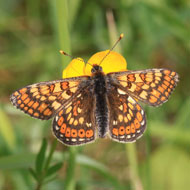Extra protection for rare species in Cornwall

Rare marsh fritillary butterfly.
An area of protected land in Cornwall has been extended to improve the fortunes of rare birds and butterflies, Natural England has said.
The new Mid Cornwall Moors site of special scientific interest (SSSI) includes six SSSIs that were originally dotted around the landscape on either side of the A30 and east of Indian Queens. Natural England said the boundaries have been extended to protect around 50 per cent more of the countryside. The new site also connects important habitats and will help wildlife to withstand climate change pressures.
Natural England has teamed up with landowners, the Cornwall Wildlife Trust and Butterfly Conservation to develop the perfect conditions for the rare marsh fritillary butterfly. The wet woodlands throughout the area are important for willow tits, which have declined by an estimated 81 per cent since the mid-1990s. New areas added to the SSSI include important breeding sites for both of these species.
Natural England, Highways England, the Eden Project and Butterfly Conservation have been working to create new habitats for butterflies and other wildlife alongside the A30 corridor and several of these have been included in the new SSSI boundary. Swathes of devil’s-bit scabious flowers, which are the main food plant for marsh fritillary butterflies, have also been grown and planted alongside the A30.
Speaking at the Eden Project, Natural England chief executive James Cross said: “The Mid Cornwall Moors are incredibly important areas for wildlife as well as people, and balancing the needs of both are critical to their conservation. Today’s notification builds on the success of the LIFE project, providing protection for the much-improved breeding habitats for marsh fritillary butterflies along the A30 corridor - making it a valuable asset, not just for businesses and visitors – but also for wildlife. Mid Cornwall Moors is now one of our top wildlife sites and we are able to give it the protection it deserves.”
The protected area now covers areas totalling six-and-a-half square miles across the wider Mid Cornwall Moors landscape. The SSSI came into effect on 23 February and landowners, occupiers and interested parties have four months to make representations or objections to Natural England.



 The veterinary mental health charity Vetlife is inviting the veterinary community to join it for a sponsored cold-water dip.
The veterinary mental health charity Vetlife is inviting the veterinary community to join it for a sponsored cold-water dip.